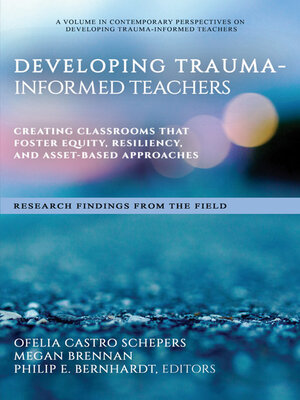Developing Trauma-Informed Teachers
ebook ∣ Creating Classrooms That Foster Equity, Resiliency, and Asset-Based Approaches ~ Research Findings From the Field · Contemporary Perspectives on Developing Trauma-Informed Teachers
By Ofelia Schepers

Sign up to save your library
With an OverDrive account, you can save your favorite libraries for at-a-glance information about availability. Find out more about OverDrive accounts.
Find this title in Libby, the library reading app by OverDrive.



Search for a digital library with this title
Title found at these libraries:
| Library Name | Distance |
|---|---|
| Loading... |
The vision and development of this edited text are driven by a deep desire to ensure that teacher candidates are thoughtfully prepared to more fully address students' needs and create classroom environments that are safe for students and teachers. Specifically, this text will provide an understanding of how educator preparation programs are providing teacher candidates with the knowledge and skills to effectively utilize an asset-based approach to foster resiliency skills that support P-12 students who have or are experiencing trauma. This text considers how programs are developing equity-focused content, curriculum, & pedagogy to ensure teacher candidates can integrate trauma-informed practices as well as develop their own resiliency skills. This resource highlights important and relevant tools, strategies, and approaches for preparing future teachers to implement traumainformed practices within their classrooms.In recent years, much attention and resources focused on preparing teachers to more comprehensively address, acknowledge, and understand childhood trauma and the impact it has on students' lives inside and outside of the classroom. This text will be of interest to all those working in institutes of higher education, alternative licensure programs, and organizations, public schools, and districts involved with the preparation of teachers and/or professional development of in-service educators. It has the potential to serve as a catalyst for teacher preparation programs to more intentionally integrate trauma-informed practices in meaningful ways and contribute to a glaring gap within the literature focused on the systematic ways in which childhood trauma and resiliency development are being addressed in the preparation of teachers.







